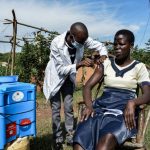“It’s been a total nightmare. I’ve called eight different government and private facilities today alone trying to schedule a vaccine appointment for my parents. Each facility has a different set of rules; some even charge for the vaccine – none had available appointments.”
That’s how Suzanne Kidenda, program officer for the Physicians for Human Rights (PHR) Program on Sexual Violence in Conflict Zones in Kenya, described her experience trying to secure COVID-19 vaccines. Kidenda’s situation is shared by many people across the globe who have struggled to find vaccines amid severe global supply shortages and the extreme hoarding of vaccines by higher-income countries. In an optimistic move, the Kenyan government lifted lockdown restrictions in May after a third wave of the virus, but without broader access to vaccines there is a significant risk of a further surge in infections. The pandemic has been enormously harmful to the Kenyan economy, and prolonged periods of restrictions are not long-term, durable solutions. While widespread vaccination is the best hope for ending the pandemic globally, it remains an elusive goal for Kenya under current conditions.
Since March 2020, Kenya has reported more than 174,000 COVID-19 cases and more than 3,300 deaths, according to the World Health Organization (WHO). There has been an ongoing strain on the health care delivery system: many hospitals and clinics lack enough beds to meet the needs of an increasing number of severe COVID-19 cases, and the country suffers from a shortage of oxygen for patients in need of respiratory support as well as personal protective equipment for health care workers, many of whom continue to fight the pandemic without the benefit of vaccination.
As Kenya struggles to vaccinate its highest-risk populations, major world powers such as the United States and UK have already inoculated roughly half of their adult populations with at least one dose of the vaccine.
A glimmer of hope arrived in March 2021, when the Kenyan government received 1.1 million doses of the SII-AstraZeneca vaccine through COVAX, the global vaccine distribution effort backed by the WHO. The original rollout plan was segmented into three phases of eligibility: health care and certain other public-facing workers, people over age 58 and who have certain medical conditions, and other people in vulnerable conditions, such as those living in informal settlements. The initial distribution plan quickly eroded when well-connected people demanded they be vaccinated before priority populations. The government further allowed vaccination of foreign diplomats over vulnerable Kenyan populations. The prioritization of politicians and foreign diplomats, in particular, drew significant criticism. Elderly and low-income people seeking to be vaccinated often wait in line from 5 a.m. every day, only to be asked to return the following day. Appointments are nearly impossible to find, as there is no standardized scheduling system, and many clinics are allowing people to skip the line for bribes as high as $100, an amount that most Kenyans cannot afford.
As of June 2021, Kenya had been allocated 3.56 million vaccine doses through COVAX. Only one-third of those doses have been delivered, and even the full allocation is only enough to cover three percent of the population. As Kenya struggles to vaccinate its highest-risk populations, major world powers such as the United States and UK have already inoculated roughly half of their adult populations with at least one dose of the vaccine. Nearly 9 of every 10 vaccinations globally have gone to people in high- and upper-middle-income countries, which continue to hoard vaccines and resist attempts to increase global vaccine production and distribution to the levels needed to reach widespread protection. Some of these countries, including the United States, have backed a temporary waiver of COVID-19 vaccine-related intellectual property that would gradually ease access to vaccine recipes. This would enable increased production and wider reach for last-mile delivery, but none have created the kind of comprehensive plan to end the pandemic that PHR and others have called for.
If people cannot access the vaccine because of where they live, the world will fail to beat the COVID-19 pandemic and fail to uphold one of the most fundamental of human rights: the right to health.
COVID-19 and the rapid proliferation of virus variants are proving that no country will likely be truly free from the disease if other countries go unprotected. The problem is global and so must be the solution – so that people like Suzanne Kidenda’s parents in Kenya have no more difficulty getting vaccinated than people in New York. The international community, and particularly the world’s wealthiest countries, must take steps to put global health before profit, in line with the demands of the People’s Vaccine Alliance (PVA), of which PHR is a proud and active member. If people cannot access the vaccine because of where they live, the world will fail to beat the COVID-19 pandemic and fail to uphold one of the most fundamental of human rights: the right to health. We are not safe until we are all safe.

